Mental health providers face unique challenges in today’s healthcare environment. One of the most pressing hurdles is managing the credentialing process. For many, it’s stressful and time-consuming and can detract from patient care.
This guide offers valuable insights on the best credentialing services for mental health providers to help you reach your goals, reduce stress, and allow your practice with innovative data management to improve patient care.
Azulity’s solution, provider credentialing services, is valuable for achieving objectives such as allowing healthcare organizations to use innovative data management.
Do Mental Health Providers Need Credentialing?


Mental health providers need credentialing. Credentialing helps mental health professionals join insurance panels, access a more extensive patient base, enroll with various payer systems, ensure patients receive care from competent professionals, and minimize compliance risks. Credentialing evaluates a provider’s qualifications and background information to determine whether they can join a health insurance network and bill patients.
Mental health credentialing means going through the process of becoming a member of an insurance panel. The ultimate goal is to be listed as an in-network therapist by a specific insurance company. Unfortunately, you can’t apply to one place and be credentialed with every insurance company simultaneously. You have to apply to be credentialed on each insurance panel separately. For example, if you become credentialed with Blue Cross/Blue Shield, you must still apply to be part of Universal Healthcare.
The Purpose of Mental Health Credentialing: Getting on Insurance Panels Opens Up a Whole New World of Clients
Mental health credentialing opens up a whole source of clients to therapists. While some people can afford to pay for a therapist out of pocket, most need insurance to cover the costs.
For instance, the community relies on insurance if you live in a working-class area. Only some people will be willing to pay the total price. When you get on an insurance panel, every person who has that insurance will see you listed as a possible therapist in their directory.
Mental health credentialing also allows you a certain flexibility. If you switch jobs, your mental health credentialing follows you. It is a resource you can depend upon, no matter the situation you find yourself in.
Related Reading
- CVO Credentialing
- Best Credentialing Software
- How to Credential a Provider
- Credentialing in Healthcare
- How Long Does Credentialing Take
Importance of Credentialing for Mental Health Organizations


Behavioral health and human services professionals perform essential services for patients and clientele and have a strong duty to provide acceptable, if not exemplary, care for those patients. Part of providing the best patient care is choosing qualified healthcare providers. When hiring behavioral health care employees, organizations must carry out all the standard steps, such as reviewing the candidate’s work history and conducting a background check. However, another crucial step cannot be ignored: reviewing licenses or certifications to determine applicants’ eligibility for specific roles. Here are the benefits of mental health provider credentialing.
1. Reduces Risk of Rejected Insurance Claims
Keeping track of an employee’s license status is a crucial aspect of HR management for behavioral health and human services organizations. There are several issues that these agencies may encounter if an employee provides medical services or conducts other regulated work without the appropriate credentials. Possible consequences of having employees work without valid health care credentialing include:
Rejected Insurance Claims
Insurance companies, including Medicare and Medicaid, may reject health plan insurance claims if the healthcare provider who performed the service did not have the correct medical credentialing. Reimbursement rates are often lower for behavioral health organizations than for other medical providers, creating ongoing funding issues. As such, the lost revenue from rejected health insurance claims can seriously impact an organization’s finances.
2. Lowers Risk of Lawsuits
Healthcare organizations must always be cautious of possible accusations of malpractice or legal non-compliance. Allowing healthcare professionals to practice without up-to-date credentials can expose a company to legal liability.
3. Builds Patient Trust
Patients trust healthcare facilities to provide high-quality care from qualified staff. If they find out that a treatment team member needs to have valid credentials, they can gain trust in the entire organization.
4. Simplifies Operations
The credentialing process varies by state for each license, as does the renewal process. However, it’s worth noting that many states and licensing boards require professionals that let their licenses expire to go through the entire credentialing application process again rather than the renewal process. This often requires more paperwork and may require an examination. Some licensing bodies provide a grace period for those renewing expired licenses, but it’s best to ensure that employees renew on time to avoid potential delays.
How Does Azulity Help With Hospital Credentialing Requirements?
Azulity specializes in healthcare master data management and provider credentialing services, bringing proven expertise in implementing healthcare data solutions and credentialing across the US. Our comprehensive platform ensures consistent patient, provider, location, and claims data synchronization across all systems and departments.
Key features include healthcare MDM, provider MDM, reference data management, credentialing, and provider enrollment. We serve healthcare technology leaders – from CIOs and CDOs to VPs of data platforms and credentialing – helping them eliminate the costly problems of fragmented data systems. Book a call to learn more about our healthcare master data management services today!
6 Best Credentialing Services for Mental Health Providers
1. Azulity: Mastering Mental Health Provider Credentialing
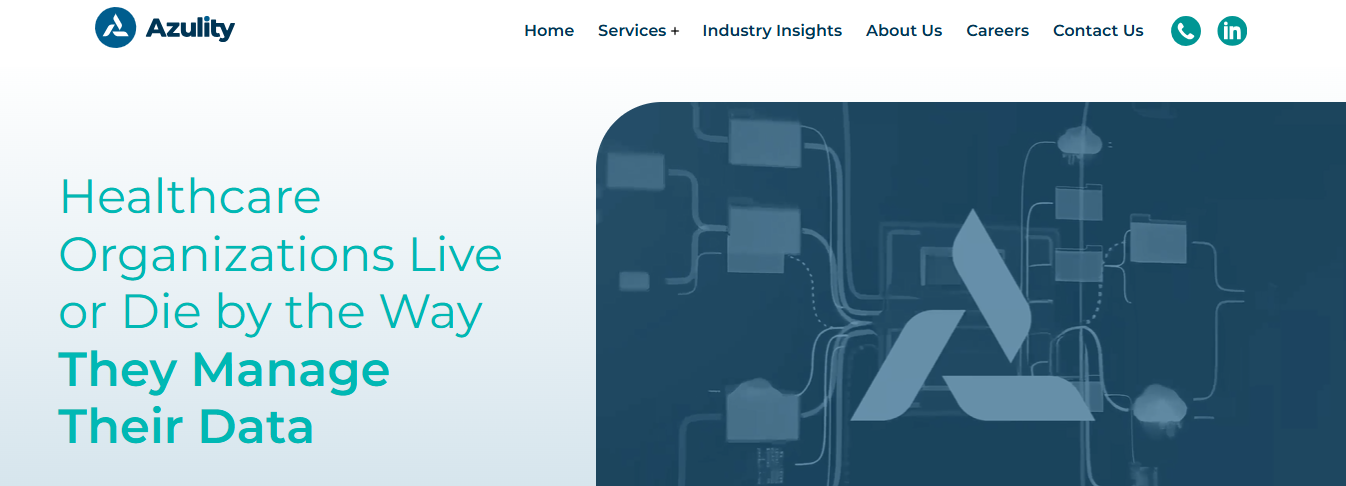

Azulity excels in healthcare master data management and provider credentialing services. Their extensive knowledge in executing healthcare data solutions and credentialing across the U.S. eases the burdens of fragmented data systems. Their comprehensive platform consistently synchronizes patient, provider, location, and claims data across all systems and departments.
Key features of Azulity’s platform include healthcare MDM, provider MDM, reference data management, credentialing, and provider enrollment. They serve healthcare technology leaders from CIOs and CDOs to VPs of data platforms and credentialing. Book a call to learn more about Azulity’s healthcare master data management services today!
2. NextGen Healthcare: Delivering Intelligent Solutions for Credentialing and Beyond
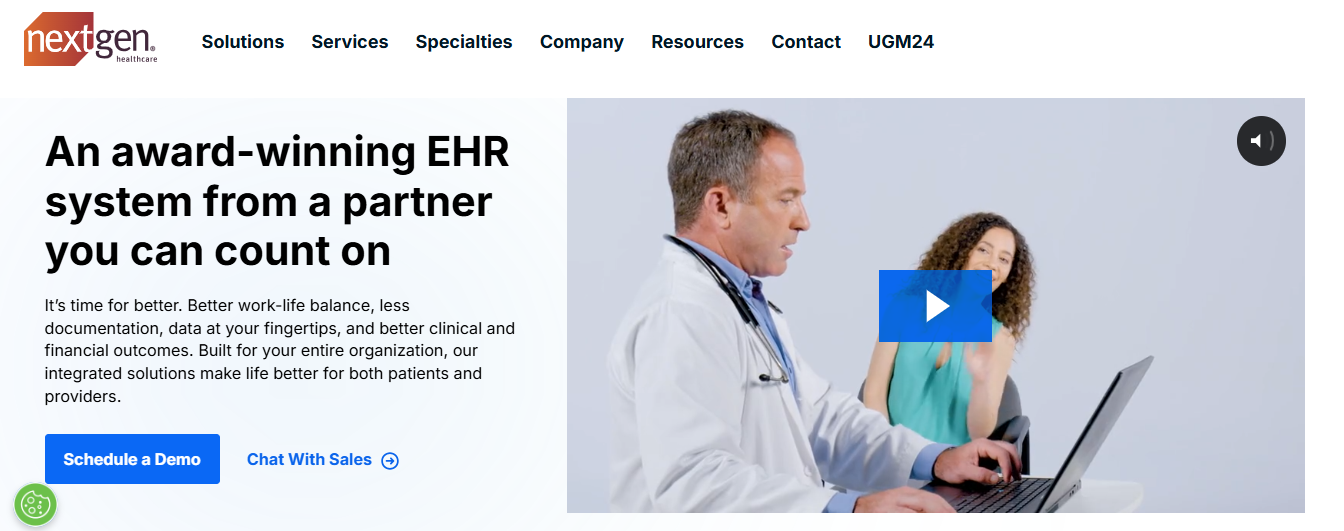

NextGen Healthcare is a leader in healthcare software and services that enable the transformation of ambulatory healthcare. NextGen Office (1-10 doctors) and NextGen Enterprise (10+ doctors) are intelligent electronic health record solutions that help ambulatory practices reduce the burden of documentation, improve clinical outcomes, connect to other health systems, increase provider and patient satisfaction, streamline revenue cycles, and foster healthier communities.
Pros
- User-friendly: The interface is designed for beginners.
- Comprehensive: NextGen offers a variety of features for managing patient care.
- Affordable: Smaller practices may find NextGen cheaper than other EHR systems.
- Secure: NextGen offers secure data sharing and storage.
- Patient portal: The patient portal can help engage patients and improve outcomes.
- SOAP notes: Users can save SOAP notes without losing their format.
Cons
- Cost: The price of NextGen may be a deterrent for smaller practices.
- Complexity: Some users find NextGen to be complex.
- Setup: Some users need help setting up and transferring data.
- Some users need to do a lot of manual work to get NextGen fully running.
3. CredentialingSpectrum: Simplifying the Complex World of Credentialing
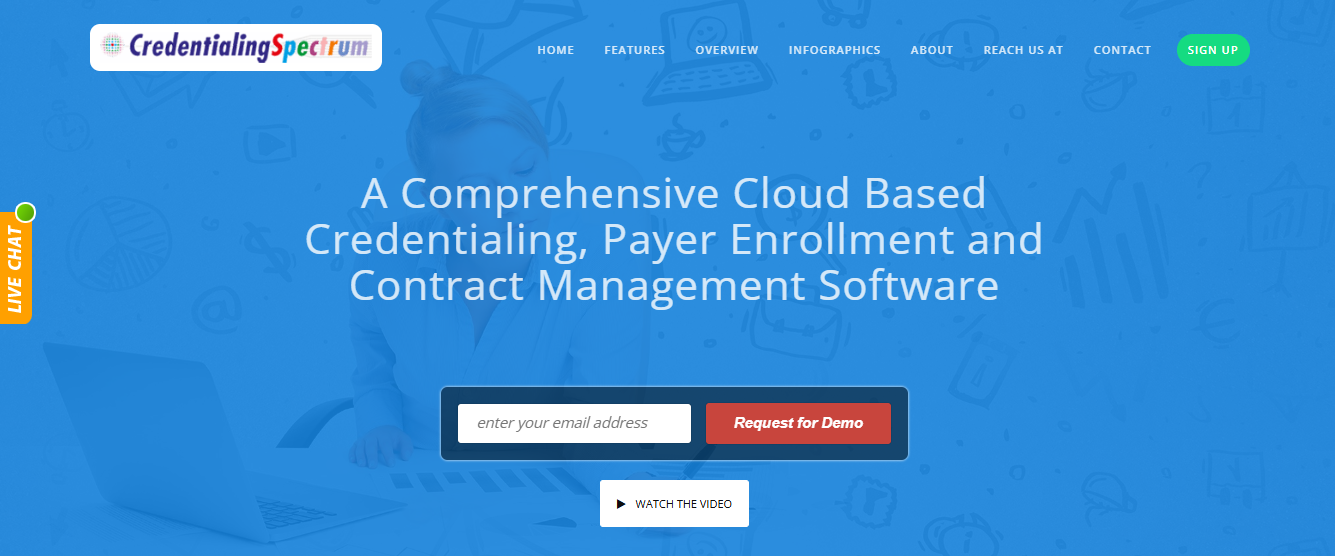

CredentialingSpectrum is a secured, cloud-based medical credentialing software for facility, payer, and contract management. It simplifies the process and increases efficiency. CredentialingSpectrum is a one-click comprehensive automation system that makes it convenient.
Pros
- Automates tasks: CredentialingSpectrum can automate provider credentialing, enrollment, and privilege management.
- Saves time: CredentialingSpectrum can help save time for staff by automating tasks.
- Improves efficiency: CredentialingSpectrum can improve efficiency for healthcare organizations.
Cons
- Credentialing is complex: The credentialing process can be complex and involve many variables.
- Credentialing can be lengthy: The credentialing process can be lengthy and labor-intensive, taking up to 90 days for an application review.
4. CredentialStream: A Comprehensive Solution for Provider Lifecycle Management
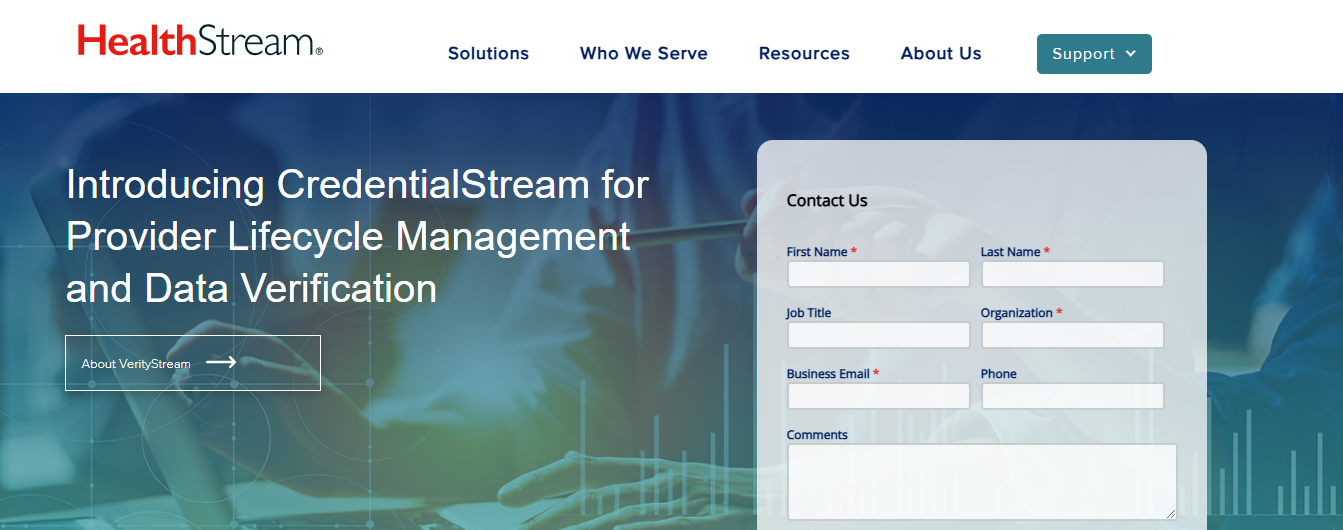

CredentialStream incorporates patented technology that provides everything necessary for requesting, gathering, and validating information about a provider, all to establish a reliable Source of Truth for downstream processes. With a modern, continuously updated platform, best-practice content libraries, and industry-leading data sets, CredentialStream stands out as the most comprehensive provider lifecycle management solution available.
Pros of CredentialStream Software
- Automation: Streamlines credentialing and compliance processes, saving time.
- Accuracy: Reduces human errors with centralized data management.
- Compliance: Ensures adherence to industry regulations.
- Efficiency: Speeds up onboarding and renewals.
- Integration: Works with HR and LMS systems for smooth workflows.
Cons of CredentialStream Software
- Cost: High implementation and licensing fees.
- Setup: Complex and time-consuming to configure.
- Learning Curve: Requires staff training.
5. KLAS: A Unique Approach to Credentialing Solutions
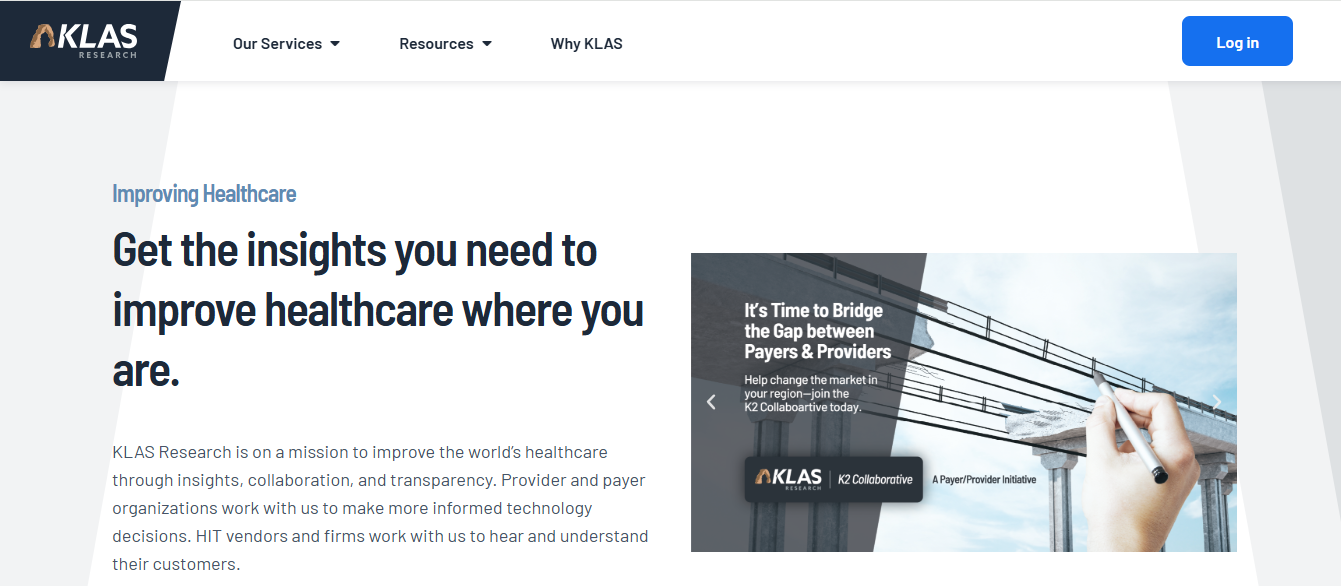

KLAS is software designed to help healthcare organizations streamline, automate, and track the credentialing and re-credentialing process. The software helps manage primary source verification and application processes, maintain and track organizational records (e.g., compliance training and immunizations), and monitor peer reviews and ongoing performance (OPPE/FPPE).
Pros
- Mission: Some say KLAS has a great mission of improving healthcare through technology.
- Culture: Some say the culture is excellent and the people are friendly.
- Reviews: Some say KLAS is praised for its honest, fair reviews.
Cons
- Work environment: Some say the work environment can be frustrating, with long hours, burnout, and underpayment.
- Growth opportunities: Some say there aren’t many areas for growth.
6. MedTrainer: Delivering a Comprehensive Approach to Credentialing and Compliance
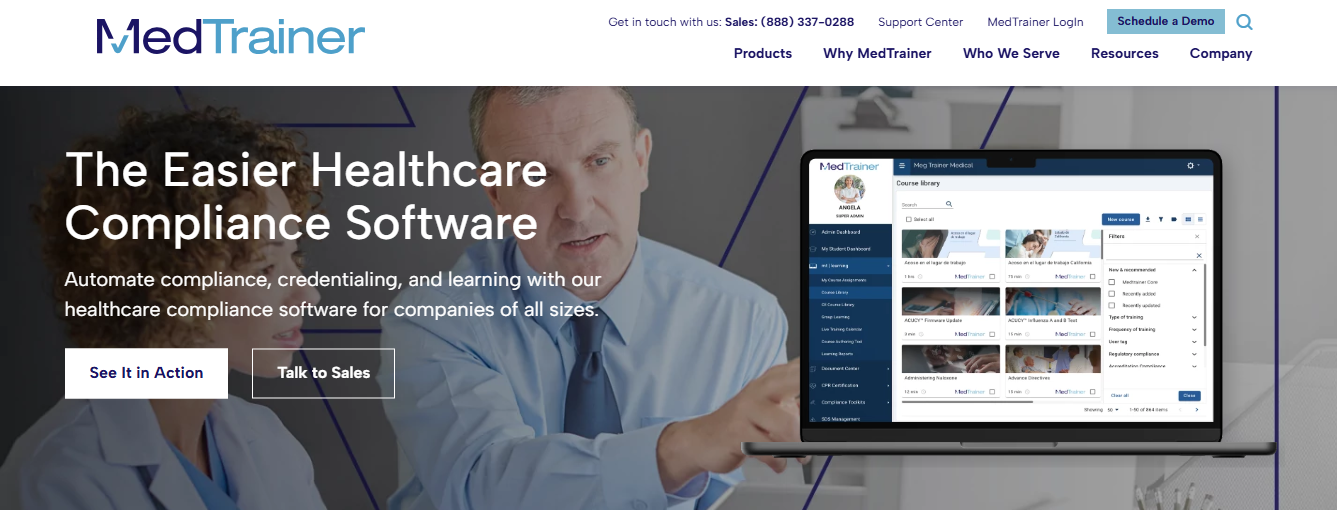

MedTrainer Credentialing is built for healthcare organizations that want to manage the credentialing process but need to complete more in less time. G2 reviewers agree, ranking MedTrainer as a High Performer for Healthcare Credentialing Software for the second straight quarter and notching the highest overall score for Quality of Support in the G2 Summer 2024 Report.
More than 3,000 organizations rely on MedTrainer to streamline compliance with a unified digital platform that optimizes workflows and accelerates education, credentialing, and documentation. As a leader in healthcare technology, MedTrainer constantly innovates to give customers the best experience and the most capabilities within one platform.
Pros
- Comprehensive solution for healthcare compliance training and credentialing.
- Intuitive dashboard for real-time visibility and analytics.
- Responsive customer support.
- Up-to-date content library from expert partners.
Cons
- Some users mentioned the learning curve to be slightly steep.
- It may require customizations to fully meet unique organizational needs.
Key Steps For Efficient Mental Health Provider Credentialing


1. Azulity: Your Partner in Mental Health Credentialing
Azulity excels in healthcare master data management and provider credentialing services. Their extensive knowledge in executing healthcare data solutions and credentialing across the U.S. eases the burdens of fragmented data systems. Their comprehensive platform consistently synchronizes patient, provider, location, and claims data across all systems and departments.
Key features of Azulity’s platform include healthcare MDM, provider MDM, reference data management, credentialing, and provider enrollment. They serve healthcare technology leaders from CIOs and CDOs to VPs of data platforms and credentialing. Book a call to learn more about Azulity’s healthcare master data management services today!
2. Get Your Documents Together
You will need to provide much information to get on insurance panels, including:
- A current license in the state you are practicing
- Proof of Liability Insurance
- NPI Number – or National Provider Identifier, a provision of HIPAA used to identify medical providers
- Current resume or CV, including employment history for the past five years
- Specific panels may require a letter of intent
- Proof of any special certifications or qualifications
- Tax ID Number– You should get an Employer Identification Number (EIN). If you have employees in your practice, this is necessary. And, even if you are a solo practitioner, having a Tax ID number that is not your Social Security Number can be helpful in your practice. You can apply for this free online through the IRS website.
- Professional references
- Some panels may want a copy of your graduate school transcript.
- Complete the application process for the CAQH Proview. The Council for Affordable Quality Healthcare (CAQH) runs a national database that most insurance companies use for mental health credentialing. It collects pertinent information and requires therapists to keep it up to date quarterly. Insurance companies use it to ensure providers have the proper mental health credentialing to be part of their insurance panels. You can submit a paper application, but don’t. It is much easier to apply online.
3. Choose Your Insurance Panels Wisely
It is common for mental health providers to want to get credentialed with as many insurance companies as possible. However, it is wise to take a strategic approach. Some questions to ask yourself include:
- What insurance is prevalent in your area of practice?
- Are they reputable? If you do all the work required to get on an insurance panel, you want to ensure the company attracts customers, stays in business, and reimburses you on time. This is more likely with an established, reputable insurance company.
- What are the reimbursement rates for mental health services? Some insurance companies pay more than others for therapy, sometimes significantly more. Private insurance is likely to reimburse more than Medicaid. If you accept Medicaid, you must prepare to make less money for those clients. (More on that below.)
- How long does it take to approve applications? Some insurance companies take much longer to process mental health credentialing. Although that may not make a difference in the long term, it can have a considerable impact when starting and trying to attract a clientele.
4. Start the Application Process
Once you have chosen your panels, you can apply to each insurance panel you want to join. Unfortunately, these are separate processes. You can find provider applications on their website and apply online.
5. Follow Up on Your Application
After a week, it is wise to call the insurance company to see if they received your application and if they require any additional information. It is also good to keep checking to see where they are in the approval process. As they say, the squeaky wheel gets the oil.
6. Don’t Let Rejections Keep You Down
Insurance panels can fill up quickly and be very competitive. It is not uncommon to get rejected by well-known companies where there are many therapists. But keep hope. You can appeal your rejection. And if the appeal doesn’t work, you should plan to reapply every several months. The capacity of these panels changes, and people come and go. If at first you fail, try, try again.
7. Understand the Contract
Once an insurance company approves you, it is essential to read the contract carefully. Make sure you understand all parts of it. And, like any contract, parts of it may be negotiable. For instance, if you disagree with reimbursement rates, you can always attempt to ask for more money. Although this won’t be successful initially, it is more likely if you have been on a panel for a long time and your rates have stayed the same. This is also an excellent time to familiarize yourself with contacting the right people and filing claims for each company.
Related Reading
- Credentialing and Privileging
- How Much Does Credentialing Cost
- Types of Credentialing in Healthcare
- Hospital Credentialing Requirements
- Primary Source Verification Credentialing
- Provider Enrollment and Credentialing
Book a Call to Learn More About Our Provider Credentialing Services
Credentialing helps verify a medical professional’s qualifications and ensures they are qualified to provide care. The process involves gathering documents and information about a provider’s education, training, experience, and history. To ensure accuracy, this information is verified against external sources, such as medical schools and professional organizations.
The process also involves assessing a provider’s competency and past performance, including any history of malpractice or disciplinary actions. This information is often used to judge a provider’s ability to deliver safe, quality care.
How Does Azulity Help With Hospital Credentialing Requirements?
Azulity specializes in healthcare master data management and provider credentialing services, bringing proven expertise in implementing healthcare data solutions and credentialing across the US. Our comprehensive platform ensures consistent patient, provider, location, and claims data synchronization across all systems and departments.
Key features include healthcare MDM, provider MDM, reference data management, credentialing, and provider enrollment. We serve healthcare technology leaders – from CIOs and CDOs to VPs of data platforms and credentialing – helping them eliminate the costly problems of fragmented data systems. Book a call to learn more about our healthcare master data management services today!
